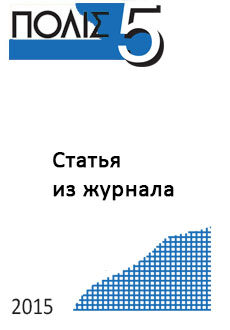Online shop of "Polis. Political Studies" Journal
We in the world, the world in us
Civic and Ethnic Identity and Perception of the Preferable State in Russia
Free!
The article analyzes problems connected with the idea of civil identity in official discourse, among the scientific elite and in mass consciousness. Attention is focused on the dynamics of multiple identity, congruence and balance of civil and ethnic identity of Russians and other Russian nationalities. The analysis is based on representative all-Russian research, research in a number of republics conducted by the Institute of Sociology of the Russian Academy of Sciences in 2013?2015 as well as discourse analysis of doctrinal and scientific materials. The topics: what do people understand of the term civic identity, and the place of the state in individual identity; how adequately the use of the concept of state-civil identity reflects the conception of Russians at the present stage; the balance of state-civil and ethnic identities among Russian and titular nationalities of the republics; evidence of the compatibility of these identities when they are positive; the importance and relevance of ethnic identity among Russians, which is no less than that for titular nationalities of the Russian republics, and civil identity for them is connected with ethnic identity more strongly than for people of other nationalities. The idea of a common state is the basic connecting segment between civil and ethnic identity, among Russians, and among other nationalities. But the idea of the preferred state differs in different social and ethnic environments and this requires the attention of society and the government to maintain loyalty to the state as a “common home of many peoples”. In order to strengthen civil identity it is important to develop a sense of responsibility for affairs in the country, which is currently shared by 30?50% of citizens in different regions of the country.
 English
English Русский
Русский

Reviews
There are no reviews yet.